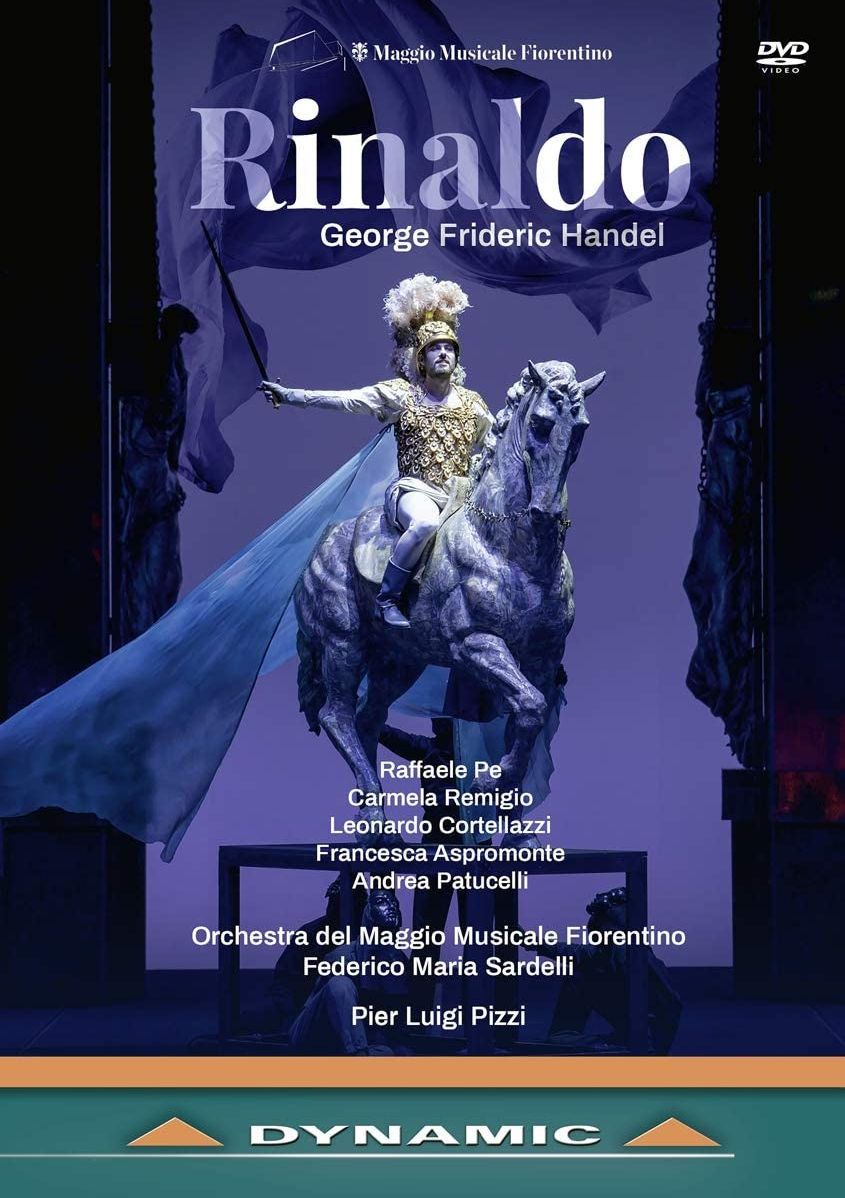HANDEL Rinaldo (Sardelli)
View record and artist detailsRecord and Artist Details
Genre:
Opera
Label: Dynamic
Magazine Review Date: 08/2021
Media Format: Digital Versatile Disc
Media Runtime: 131
Mastering:
DDD
Catalogue Number: 37896

Tracks:
| Composition | Artist Credit |
|---|---|
| Rinaldo |
George Frideric Handel, Composer
Andrea Patucelli, Argante, Bass Carmela Remigio, Armida, Soprano Federico Maria Sardelli, Conductor Francesca Aspromonte, Almirena, Soprano Leonardo Cortellazzi, Goffredo, Tenor Marilena Ruta, Siren, Soprano Orchestra del Maggio Musicale Fiorentino Raffaele Pé, Rinaldo, Countertenor Shuxin Li, Araldo, Bass Valentina Corò, Siren, Soprano William Corrò, Christian Magician, Bass |
Author: David Vickers
Pier Luigi Pizzi’s lavish production of Rinaldo was first staged at Reggio Emilia in 1985 and then put on at many other opera houses – a 1989 revival at La Fenice featuring Marilyn Horne is available on a recording of poor sound quality (Nuova Era, 4/90). Last September the Maggio Musicale Fiorentino reopened after lockdown with four performances of a reconstruction of Pizzi’s staging, described in Dynamic’s press release as ‘a stylish paragon of “hyperbaroque” that deliberately avoids both literalism and cheap provocation’. The static treatment of statuesque characters wheeled around on small platforms lends itself to the age of social distancing. Pseudo-Baroque hand gestures are hardly the real thing but the production has an appealing juxtaposition of extravagance and simplicity. The hero Rinaldo and the villain Argante both posture on equestrian statues – the latter’s enormous flowing red cape dominating the stage in ‘Sibilar l’angui d’Aletto’. A scarlet-garbed Armida enters in a chariot drawn by statues of dragons.
The fantastical Rinaldo may be the daftest and most tongue-in-cheek of all Handel’s London operas. Its plot and characters can be taken with a liberal pinch of salt. Nevertheless, it is vexatious that the text is bowdlerised harmfully. About three-quarters of an hour’s worth of the opera is removed, and several vital arias are transferred nonsensically: Rinaldo’s ‘Cara sposa’ is relocated from Act 1 (where he reacts to Almirena’s sudden abduction) to near the end of Act 2, where it makes no sense at all during his confrontation with Armida; likewise, the hero’s stinging rejection of the sorceress’s unwanted advances (‘Abbruccio, avvampo e frema’) is moved to much earlier in Act 2, where it becomes an implausible proclamation as the distracted hero jumps into a boat with two bare-breasted sirens. Weirdest of all, Armida storms off stage after her impassioned accompanied recitative, leaving her plaintive lament ‘Ah crudel nel pianto mio’ for Almirena to sing instead. The voice parts of Goffredo and the Christian Magician are transposed down an octave.
Raffaele Pe sings with agility, finesse and pathos as Rinaldo’s music requires; ‘Venti, turbini, prestate’ is both virile and graceful, even if the bassoonist cannot quite keep up. Francesca Aspromonte’s lyrical elegance and quicksilver fluency means that there is more to Almirena’s personality than ‘Lascia ch’io pianga’ (although the plea to be released from imprisonment is undermined by convoluted over-embellishment). Carmela Remigio’s feisty Armida is not to be trifled with – but the character is hamstrung by cuts and reallocations; even her spectacular entrance ‘Furie terribili’ is shortened to its bare bones. Andrea Patucelli is underpowered as Argante, whereas Leonardo Cortellazzi makes heavy weather of the little that remains of Goffredo’s role.
The Orchestra del Maggio Musicale Fiorentino play with a sure sense of crisply detailed style. A few tempos are a bit too quick for singers to navigate securely, and the fast speed chosen for the sirens’ ‘Il vostro maggio’ prevents its sensual magic. Conductor Federico Maria Sardelli plays the sopranino recorder solos imitating birdsong in Almirena’s ‘Augelletti’. The harpsichord solos in Armida’s ‘Vo far guerra’ are played flamboyantly by Giulia Nuti. Trumpets and timpani offer brawny splendour in Rinaldo’s ‘Or la tromba’ – sung by Pe with showboating panache as Rinaldo’s pent-up valour is unleashed. Albeit uneven in conception and execution, Pizzi’s imaginative staging remains eye-catching and entertaining after nearly 40 years.
Discover the world's largest classical music catalogue with Presto Music.

Gramophone Digital Club
- Digital Edition
- Digital Archive
- Reviews Database
- Full website access
From £8.75 / month
Subscribe
Gramophone Full Club
- Print Edition
- Digital Edition
- Digital Archive
- Reviews Database
- Full website access
From £11.00 / month
Subscribe
If you are a library, university or other organisation that would be interested in an institutional subscription to Gramophone please click here for further information.




